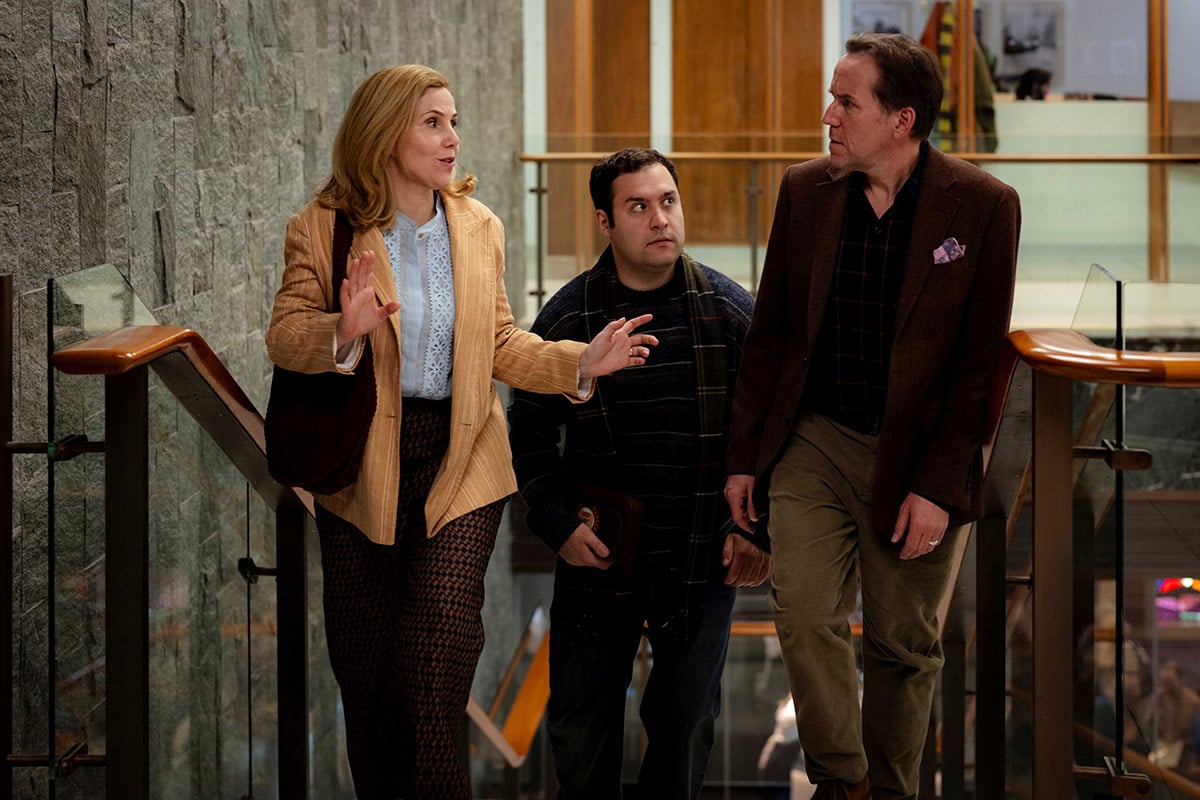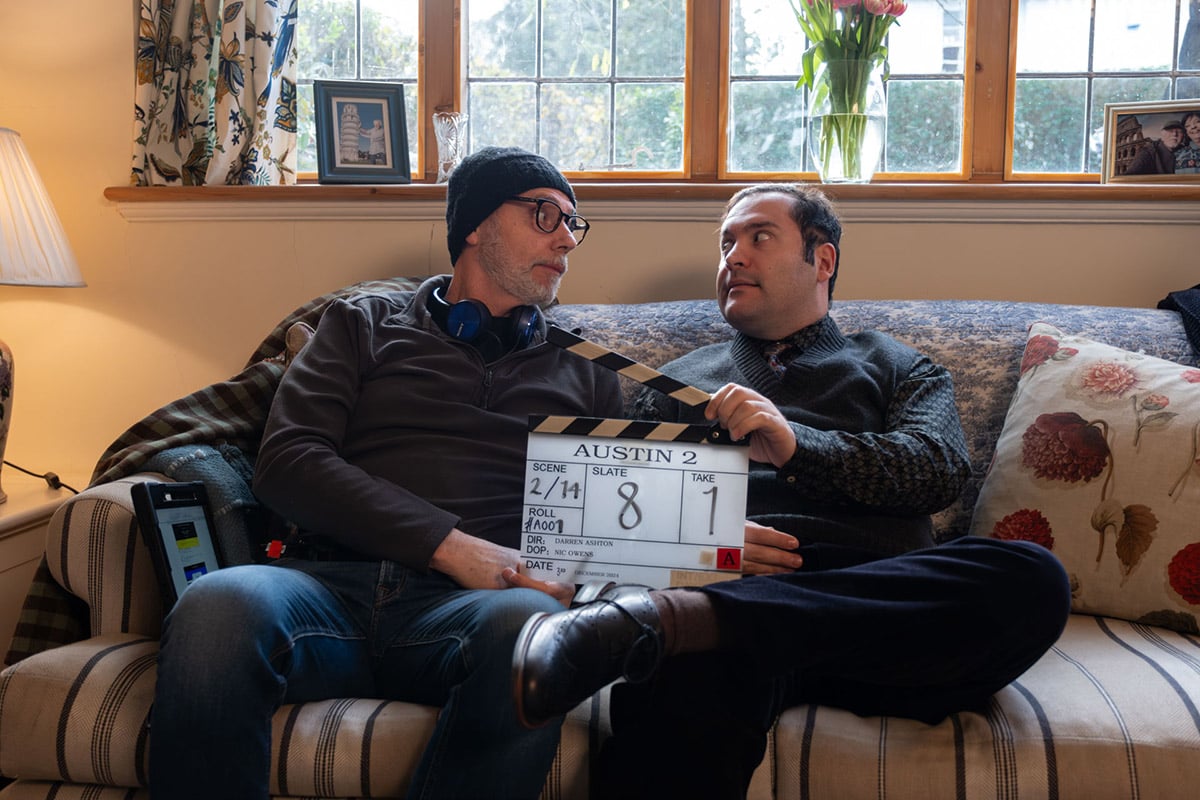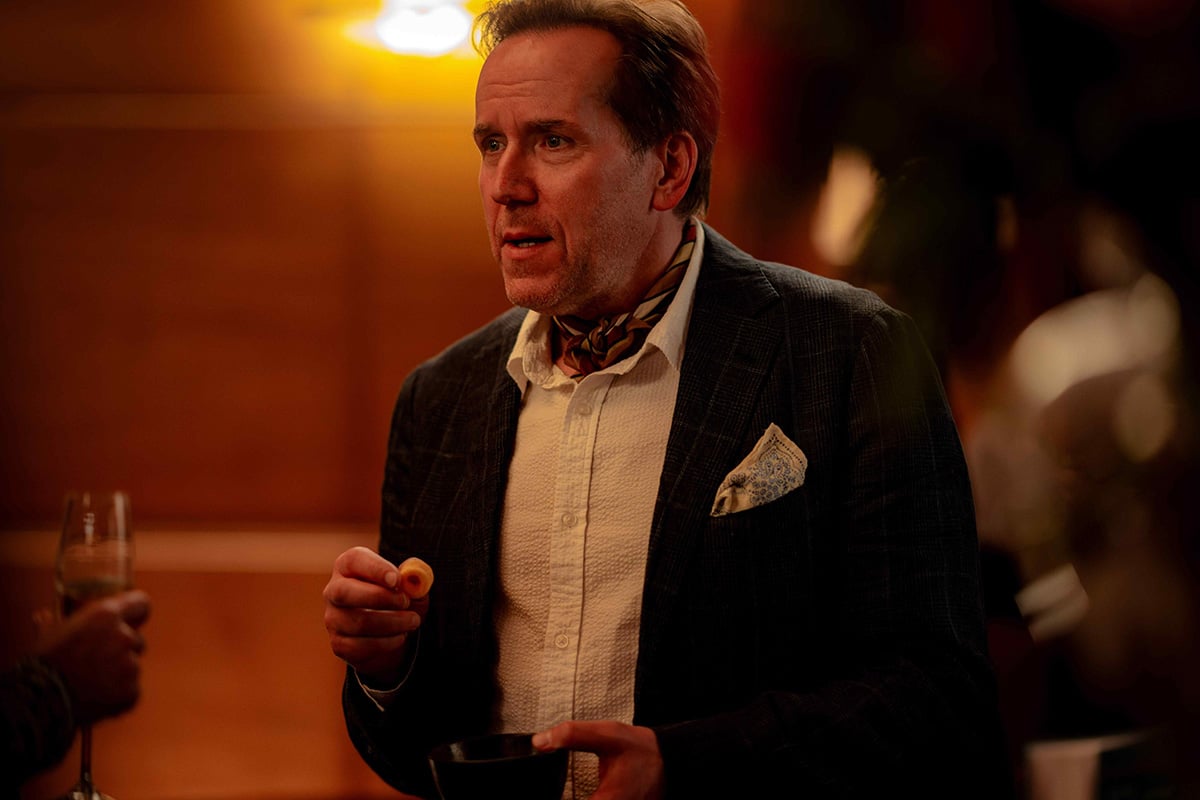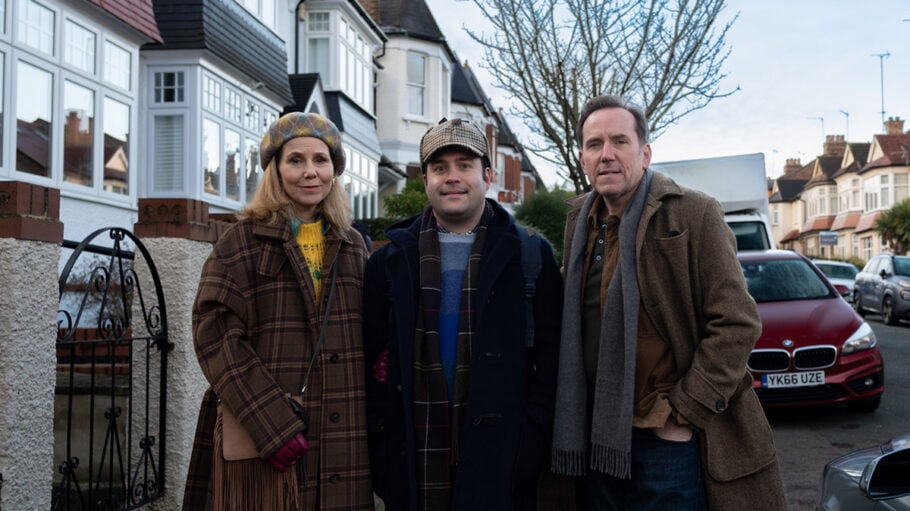Initially, Ben Miller wasn’t just set to star, co-create and executive produce warmhearted AACTA– and Logie-nominated Australian comedy series “Austin.” The plan was for the “Professor T,” “Death in Paradise,” “Paddington 2” and “Johnny English” actor to be a character in it, too, opposite “Love on the Spectrum’s” Michael Theo doing the same. “Originally it was going to be Michael playing a version of himself and Ben playing a version of himself, with Michael turning up to the set of ‘Bridgerton’ (which Ben was in at the time), for example,” co-creator, executive producer and director Darren Ashton tells Variety AU/NZ.
“But we felt that had a limited life — and then Ben suggested we interrogate the idea of a successful children’s author who is a bit of a poor dad. Ben is a bestselling author of children’s books (but a great dad), so it was a great jumping-off point.”
Adds Miller, who has the family-friendly “Fairytale Woods” franchise among his output for young readers: “I think that emerged in a Zoom with Darren and Sally [co-star Phillips), where we were wondering what sort of character to partner Michael with. We liked the idea of children’s authors, but a writer/illustrator combo, so there would be lots of friction between them. That seemed like a good counterpoint to a story about a man discovering he has a son.”
“Austin” first sprang from Ashton introducing Miller, who he initially directed in 2007 mockumentary “Razzle Dazzle” and remained friends with since, to “Love on the Spectrum” — and to Theo in it. From that moment, the Australian-made, ABC- and BBC-aired “Austin,” which returned for its second season in late July 2025, was always certain to have a personal skew. As Ashton and Miller note, the premise evolved into the winning setup that audiences have been loving since 2024, featuring Theo making his acting debut as its neurodivergent namesake, who discovers that an English children’s author might be his father. That news takes Miller’s Julian Hartswood by surprise just as he’s getting cancelled for a social media incident during a book tour Down Under, and also destabilises his marriage to Phillips’ Ingrid, his creative partner of more than two decades on the popular “Big Bear” franchise.
Season 2 picks up in London, where the show’s first run ended with a cliffhanger via DNA test results. Austin’s book about his trip to the UK, “An Autistic Guide to Britain,” sits at the heart of the eight new episodes, alongside Julian and Ingrid trying to adapt “Big Bear” into a TV series, a move that they had previously resisted for years.
How art has drawn upon life for Miller in “Austin” might’ve changed, but building a sitcom around Theo didn’t ever waver. Miller could see the pieces coming together when the two connected online. “I think it was when Michael and I did an improvisation over Zoom together, and it quickly became apparent what a brilliant comedic mind he has — and that he was totally unfazed by the process,” he advises. “We just clicked. And he was everything I’d hoped he’d be from seeing him on the show: courteous, determined and extremely charismatic.”

Ashton, the Creative Executive — Development and Production at Northern Pictures, the production company behind both “Love on the Spectrum” and “Austin,” initially steps back further for the show’s ‘this is it’ moment — aka when he knew that the project was coming together. “There were two parts to it, like a good setup and payoff,” he shares. “When I showed Ben and Jess [fellow executive producer Parker] an excerpt of Michael from ‘Love on the Spectrum’ and pitched the simple premise to Ben, his eyes lit up — I had goose bumps. The second and most significant payoff was when we did an online chemistry session with Michael and Ben that was completely improvised. Michael got stuck into Ben, as his fictional dad, for sleeping with Austin’s mother! It was natural, heartfelt and very funny.”
Narrative-wise, “with the first season, we wanted to build stories from Michael’s experience, to reflect stuff he’s been through, such as bullying at work,” expands Miller. “With the second season, I’d say we’ve leaned more into Michael as an actor. Austin breaks bad, basically, and Michael is hilarious playing his evil alter-ego. Although I seem to remember he wasn’t that keen on the hair …”
For Ashton, “Michael’s DNA is all over the show, and Austin’s is in it,” he jokes, before digging into how “there were numerous sessions with Michael during the writing and in the writers’ rooms.” He continues: “Michael also had the outlines and scripts sent to him ahead of anyone else. What was really fabulous was the way Michael’s parents shared their experience of raising and living with Michael. Not just the practical but the emotional. There are events in both seasons that are inspired by tentpole moments in Michael’s life. Mel [Austin’s mother] is very much informed by Vanessa (Michael’s mum) and Gia [Carides] puts her beautifully warm spin on it.”
Of that breaking bad, it’s “not in a Walter White way, but he misbehaves and disappoints his family,” Ashton says. “We wanted to show that Austin, like Michael who inspires the character, has a range of emotions and behaviour,” he explains, calling it the most exciting element of the season alongside watching Theo grow as an actor. “Michael found it emotionally challenging, but his outbursts and on-screen arrogance is as skilful as any actor I’ve worked with.”

With not just Phillips and Carides but also Roy Billing and Ellie McKay among the core cast, as well as Rob Collins and Kate Elliott back from Season 1, plus Rodger Corser, Katrina Milosevic, Claire Lovering and Natalie Abbott all newcomers in Season 2, the series doesn’t solely rely upon Miller and Theo’s dynamic as Julian and Austin, but the pair’s relationship is crucial. Again, the personal strikes: “truth be told, we are playing quite close to who we are in real life, so a lot of what we build on is real experiences and genuine reactions,” notes Miller. “Though I’m not quite as self-obsessed as Julian. Not quite.”
The positivity of “Austin” is also close to Ashton’s heart, as shaped by his experiences with his heath. “I do enjoy a dark comedy, but optimism has always been more appealing to me. And yeah, that philosophy was amplified when I was going through my cancer treatment, which coincided with the development of ‘Austin’, so it was an organically emotional response. It manifested in practical ways, too, like no profanity, no ‘nasty’ or punching-down comedy, and having pathos.”
Northern Pictures’ success in helping to ensure that neurodiversity is represented on-screen, and its efforts to assist in actively dispelling stereotypical images of people with autism, is just as connected to Ashton’s life. “Neurodiversity is very personal for me. It’s part of the fabric of my immediate and extended family.”
“My nephew, who was non-verbal, recently passed away at a very young age. He lived in Townsville and unfortunately, I didn’t have as much contact with him in later years as I would have liked, which upsets me, to be honest. He got the chance to live independently as a young adult thanks to the NDIS. At the funeral, all his carers turned up, as well as a lot of members of the neurodiverse and disability community. People spoke of his unique and positive attitude to the world around him, and his love of wind, sand and surf. He had an infectious smile,” Ashton continues.
“And while I consider myself aware of neurodiversity, it was a reminder that it is a wide and wonderful spectrum. That my nephew was so different to Michael and many others. Which is why I guess I get a little upset when there’s a critique of our shows around representation. We don’t pretend to represent every neurodivergent person. In the case of ‘Austin’, it’s informed by Michael and his family.”

Even when “Austin” was a fledgling sitcom, spying the potential for more came quickly. “We’ve always thought that the themes in ‘Austin’ were ones we’d like to take time exploring, and all the different dynamics — such as Mel, the mother who has brought Austin up to be who he is, and now has to let go — are ones that we’d like to take further,” says Miller. That hasn’t changed now that Season 2 is streaming. “If people want more, we’d love to keep going. But as you know, everything these days depends on viewing figures, so we don’t take anything for granted.”
“I remember Ben calling me after he’d seen the rough cut of Episode 1 and he was quite emotional. For the first three minutes, he just said, ‘Darren, Darren … Darren … mate, mate …’,” advises Ashton. “He felt we’d captured something special, especially around Michael and the chemistry of the characters. It’s nice to have a gut feel, but the audience is the ultimate judge and jury and luckily for us, it resonated, and we had great responses here and in the UK.”
At the 2025 AACTA Awards, “Austin” was nominated for Best Narrative Comedy Series, and Theo for Best Acting in a Comedy. At this year’s Logies, Miller and Theo are contending against each other for Best Lead Actor in a Comedy, Phillips is in the running for Best Lead Actress in a Comedy and the series is up for Best Scripted Comedy Series.
“I don’t think you ever open a new show without wondering how it’s going to go down, and with ‘Austin’ it was even more scary because we were all so invested in it,” notes Miller of the response. “Apart from anything, Michael was obsessed with statistics, and the fact that few shows go on to have a second series really freaked him out. So it was a huge relief that it was well-received.”
The enthusiastic embrace by viewers meant “another season,” Ashton riffs. “It’s always great to have your work appreciated, no matter what career you’re in, but in the creative fields there’s a lot of ‘yourself’ that goes into creating a show, it’s a lot more personal. So, the acknowledgement and success has a positive emotional impact — like when your dad says you did well on the footy field.”































